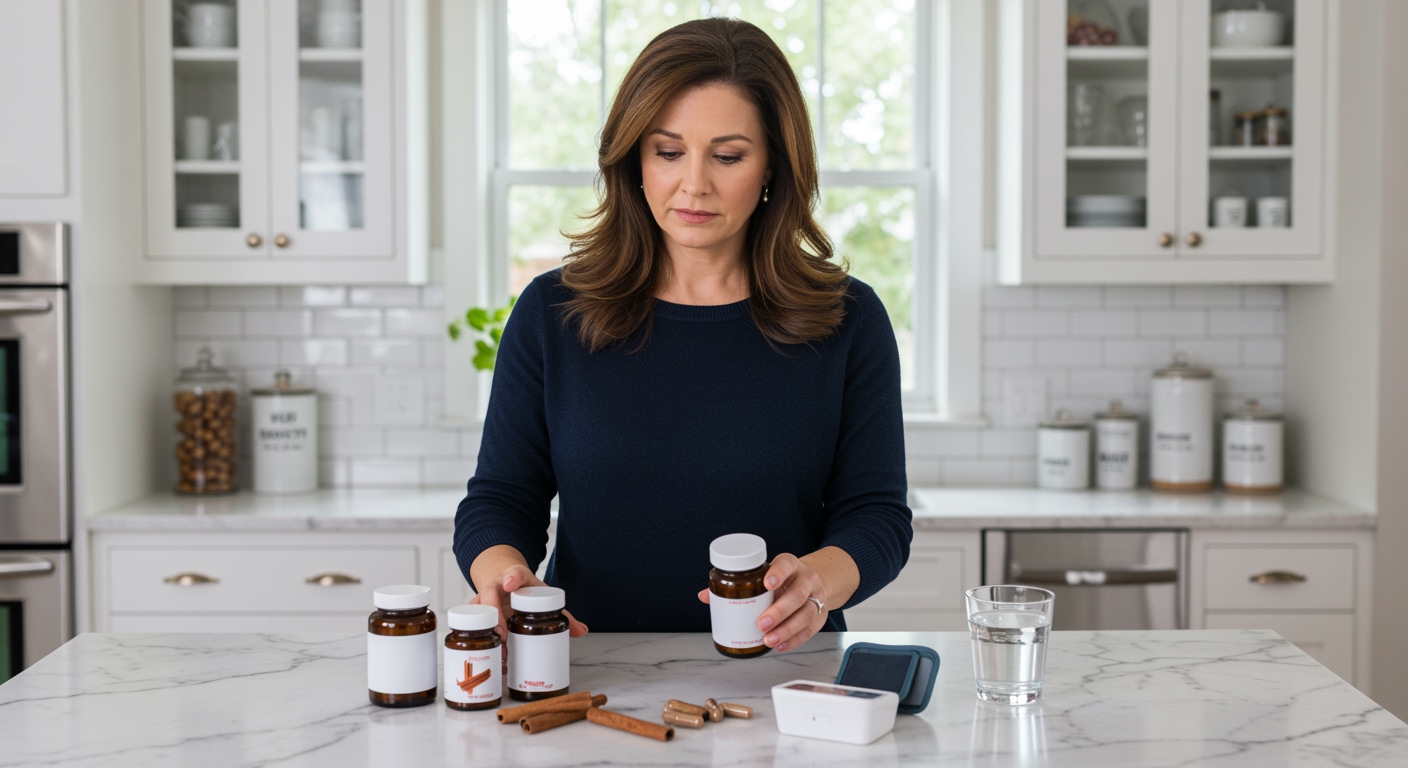✪ Key Takeaway: Cinnamon supplements can dangerously lower blood pressure in people with existing hypotension or those taking blood pressure medications.
Introduction
Your morning coffee tastes better with cinnamon, but what if that innocent spice could send your blood pressure plummeting to dangerous levels?
Many people take cinnamon supplements hoping to control their blood sugar or boost their metabolism, never realizing these same supplements might be silently affecting their cardiovascular system in ways they never expected.
Hi, I’m Abdur, your nutrition coach and today I’m going to explain exactly how cinnamon supplements can impact your blood pressure and when this becomes a serious health concern.
How Does Cinnamon Actually Lower Blood Pressure?
Cinnamon contains powerful compounds called cinnamaldehyde and procyanidin that directly affect your blood vessels.
These compounds work by relaxing the smooth muscle cells in your arterial walls, which causes your blood vessels to widen.
When your arteries expand, your heart doesn’t need to pump as hard to move blood through your system.
This mechanism is similar to how prescription blood pressure medications work, but cinnamon does it naturally through a process called vasodilation.
Research shows that cinnamon also improves insulin sensitivity, which indirectly supports healthy blood pressure by reducing inflammation in your blood vessels.
The problem starts when people take concentrated cinnamon supplements without understanding how potent these effects can be.
✪ Fact: Just 1-6 grams of cinnamon daily can reduce systolic blood pressure by 5-10 mmHg in some people.
Who Faces The Greatest Risk From Cinnamon Supplements?
People with naturally low blood pressure face the biggest danger from cinnamon supplements.
If your normal blood pressure reads below 90/60 mmHg, adding cinnamon supplements could push you into dangerous hypotensive territory.
Those taking prescription blood pressure medications create a particularly risky situation when they add cinnamon supplements to their routine.
The combination can cause an additive effect, where both the medication and the supplement work together to drop your blood pressure far below safe levels.
Elderly individuals also face higher risks because their cardiovascular systems are often more sensitive to changes in blood pressure.
People with diabetes who take both blood sugar medications and cinnamon supplements need extra caution, as both conditions and treatments can affect blood pressure regulation.
✪ Pro Tip: Always check your blood pressure for two weeks before starting any cinnamon supplement regimen.
What Are The Warning Signs Of Dangerously Low Blood Pressure?
Dizziness when standing up quickly is often the first sign that your blood pressure has dropped too low.
This happens because your brain isn’t getting enough blood flow when you change positions rapidly.
Fatigue and weakness that seems to come out of nowhere can indicate that your organs aren’t receiving adequate oxygen-rich blood.
Blurred vision occurs when the blood vessels in your eyes don’t receive enough pressure to function properly.
Nausea and lightheadedness are your body’s way of telling you that something is seriously wrong with your circulation.
In severe cases, people experience fainting spells or feel like they might pass out, especially during physical activity or when standing for long periods.
Cold, clammy skin and rapid, shallow breathing are emergency signs that require immediate medical attention.
✪ Note: If you experience three or more of these symptoms together, stop taking cinnamon supplements immediately.
How Much Cinnamon Becomes Dangerous?
Most cinnamon supplements contain between 500-2000 mg of concentrated cinnamon extract per capsule.
This concentration is much higher than what you would get from sprinkling cinnamon powder on your food.
Studies show that doses above 6 grams daily can cause significant drops in blood pressure, but some sensitive individuals react to much smaller amounts.
The type of cinnamon also matters – Ceylon cinnamon tends to have stronger blood pressure effects than regular cassia cinnamon.
Taking multiple doses throughout the day creates a cumulative effect that can be more dangerous than taking one large dose.
Your individual response depends on your current health status, other medications, body weight, and how efficiently your liver processes the active compounds.
✪ Pro Tip: Start with the lowest possible dose and monitor your blood pressure daily for the first month.
What Should You Do If You Experience Problems?
Stop taking the cinnamon supplement immediately if you notice any symptoms of low blood pressure.
Drink plenty of water and add a small amount of salt to your next meal to help raise your blood pressure naturally.
Lie down with your legs elevated above your heart level to improve blood flow to your brain and vital organs.
Contact your healthcare provider within 24 hours to discuss what happened and get professional guidance on whether you should continue using cinnamon supplements.
Keep a detailed log of your symptoms, including when they started, how long they lasted, and what you were doing when they occurred.
If you’re taking blood pressure medications, your doctor might need to adjust your prescription dosage to account for the cinnamon effects.
Never try to counteract low blood pressure by taking stimulants like caffeine pills or energy drinks, as this can create dangerous cardiovascular stress.
The Bottom Line
Cinnamon supplements can indeed lower blood pressure dangerously in certain individuals, particularly those with existing hypotension or those taking blood pressure medications.
Smart supplementation means understanding that natural doesn’t always mean harmless, and powerful effects require careful monitoring.
I’d love to hear about your experiences with cinnamon supplements or any questions you might have about managing blood pressure naturally – please share your thoughts in the comments below.
References
At NutritionCrown, we use quality and credible sources to ensure our content is accurate and trustworthy. Below are the sources referenced in creating this article:
- PMC: Cinnamon and Blood Pressure Research
- Healthline: Side Effects of Cinnamon
- Ubie Health: Cinnamon Blood Pressure Effects and Dosage
- WebMD: Ceylon Cinnamon Information
- MedicineNet: 7 Side Effects of Too Much Cinnamon





